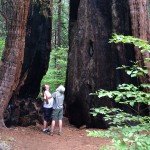Last night I had the strangest dream, one that I think has a lot to tell us about the U.S. healthcare system.
I dreamed I was leading a team that was developing a robot. I don’t recall the purpose of the robot, but I do remember there were several teams competing for the same prize, and that my team was succeeding where the others were not.
Now, what you need to understand is that way back in the day (we’re talking the early 1990s) I came up with the idea of a robotic vacuum that I called the Yarn Shark. It was very similar in intent to a modern Roomba. I did a lot of booking up on robotic systems and architecture back then with the idea of making a sellable product. That robot never came about, but the knowledge remained.
So in my dream one of the things we’d done was run a string of LED lights along the inside of the wheels and mount opposite of the lights a single light sensor that could count them as they passed. This was an old school solution to help your robot know where it was at, what its speed was, and in what direction it was traveling. To give you an example, if the wheels on your robot are 3″ in circumference, and there are 8 lights along its edge, then if your sensor “sees” 8 flashes of light, it’s fair to guess your robot has moved forward 3″. Pretty basic stuff.
All of the robot teams in my dream had been using these LED lights to help them navigate. The main difference was that the other teams had very carefully wrapped their lights around the wheels so they were all spaced apart uniformly. But on our robot, we wrapped the lights any old way, not caring how exact the lights were spaced. Now that inexactness of our spacing should have lead to less accurate navigation, as you can imagine, and the other teams assumed. However, the opposite was true. Our robot consistently navigated far better than the others. This was not because randomly spaced lights are better than uniform ones, but because our software design was different.
The other robots relied upon their accurate spacing, and were programmed with the assumption that every flash of a light was a reliable indicator. Our system, by way of contrast, was designed from the get go with the idea that you could not trust what the sensors were telling the processor. In effect, our processor did not trust its sensors to be reliable, and therefore computed its location differently.
BTW this is largely true. In the real world a wheel moves forward and backward in ways that can be surprising, For instance, when a robot is turning the outer wheels roll a longer distance then the inside wheels. Which leads to the question, wheel is the reliable one? If a robot happens to back up and turn, then its possible a light will trigger the sensor while the wheel is going forward, and then backward. Your processor, not being able to know anything else about the wheel, might assume those flashes indicate consistent motion in one direction or the other, when in fact the wheel had gone both ways.
Our software was based upon the assumption that things could go wrong, and therefore it needed to ask itself more questions to be sure of its location. What did the other wheels indicate? What does the forward radar say? Etc. In engineering, this is called a more robust system. It assumes up front that things can go bad, and it reacts accordingly. Mind you, more robust systems are not perfect, among other things they require much more programming, and they take up more processing time than more simple systems. But they have one decided advantage, they’re not easy to surprise. Errors, in such a system, are expected. And this last part was the key to our robot’s success.
And now we get to the point of this essay. You see, I think Healthcare systems need to be designed more robustly. They need to assume from the get go that people are going to screw up, and have a solution at hand when it happens.
Mind you, I don’t go around assuming people are all screw ups, but when it comes to healthcare I think it fair to say us humans, even the most careful thinking of us, do not fully appreciate the inherent problems. For instance, one can be fully insured for medical problems, but if you’re in a bad auto accident, your health insurance will not cover your house payment that you cannot make because you’re lying in a hospital bed instead of at work. Or what happens if you meet the love of you life, get married, and then you both discover your partner suddenly develops a medical problem so severe it requires a transplant? (this is not an idol question, it happened to a family member) And most people do not worry that if they lose their job they will drink themselves to death, but this is happening so much that the life expectancy for white males of middle age has actually dropped in recent years.
Back before Obamacare our medical insurance system simply cut people off if they cost too much. This wasn’t as bad as it sounds, eventually the person cut off would usually qualify for medicare. The problem is that last step was pretty steep, because medicare requires you to be broke before its cuts in. In realty, what happened is your insurance would stop making payments, while you continued to need medical care. Next, you’d go through your savings like poop through a goose, and eventually medicare would kick in right about the time you declared bankruptcy. So you would get your medical care, but only after you lost your house, your kid’s college fund, and your car.
This is stupid for more reasons than I care to count, primary among them is the loss of a good tax-paying citizen, replacing them with a tax liability. And all for a cost that would have been simple to fix at the time of the problem. It used to be that upwards of 60-100k people a year went through medical bankruptcies. That is 100,000 tax payers were reduced to welfare recipients, every year! Not only were we still footing the bill for their medical care, but then we all but insured that these people would never help pay for their bills out of their own pocket. Poor people being notorious for not paying taxes like the middle class do.
This is what I mean by not being a robust system. If your healthcare requires you to go bankrupt, it’s not really caring for you, is it? It’s just keeping you from dying. We need something a little more robust than ‘keeping us from dying”. That is not a good standard for healthcare.
And this is where I get back to my dream and robust systems. As we debate our future healthcare system, I think it imperative we keep in mind that humans get sick in unpredictable ways, and all of us need healthcare for the day when the unpredictable becomes the real. We know the unpredictable will happen–we know people will get cancer, or get in car accidents, become an alcoholic, or suddenly need a new pancreas–the problem is we don’t know who. Even worse, us humans are notoriously bad at assessing our needs. Every healthy human you meet between the ages of 16 and 30 are sure they don’t need medical care, which is true for all of us, but especially the young, right up until the moment that it isn’t. And when that happens, when young adult suddenly needs healthcare, should we penalize them for acting in a way that every healthy person does at their age? That seems pretty counterintuitive to me, and yet it’s a part of the proposed new healthcare.
A better system, that is a more robust system, would assume that they young are going to act like the young, and plan accordingly. Like the lights along the rim of the wheels, we can assume they’re all correct, or assume they are not. Which one is the more likely outcome? Well 90% of the time it will be that they are correct, but it’s that 10% error rate that is the most costly. The same thing applies to healthcare. Humans will mostly pick wrong, and mostly they will be okay. But when things do go south, because we know it does happen to somebody, if there is no system to cover that, then the person without coverage goes from an asset to a liability. A liability in which we all foot the bill.
The most important thing to remember while looking into changes to our healthcare, is that at the end of the day we all pay for everyone’s medical care. Something I think the Republicans are not fully aware of. It doesn’t matter who you are, what your skin color is, or what side of the tracks your family came form–at some point if you don’t foot your medical bills, then we do. We meaning ALL Americans. The cost either comes out of medicare, or it comes out of higher premiums for the healthy, but we do pay for it. Ironically, this is perhaps the single most egalitarian thing we do as Americans, we pay for each other’s healthcare.
Knowing that, doesn’t it make sense to pay for medical care in the lease expensive manner? I ask because emergency medical care is a lot more expensive than preventative care. We’ve all know this. It’s far cheaper to supplement a poor person’s healthcare, and have that care be pro-active, than it is to pay for their care in a hospital emergency room. It’s far cheaper to lightly supplement a middle-class family’s healthcare, than to wait for them to become bankrupt and pay for all of their healthcare. In terms of outcomes, one is far more expensive than the other. In other words, one is far more robust than the other.
And when it comes to tax credits verses subsidies, which is the more robust system? Speaking for my family I can say we’d do far better with a tax credit. But I run my own business and we’ve been playing the tax game for years. We’re used to setting a certain amount of our income aside, setting aside more for healthcare is not an issue. Bear in mind, we are very much the exception here. Most people, who are not used to setting money aside with every paycheck, absolutely suck at it. Every time I talk to a new freelancer I hear the same thing, they know they need to set money aside, but they don’t do it. When I first started freelancing I sucked at it too, up until I ran into problems with the IRS. So what’s the likelihood that people are goring to budget for their healthcare sufficiently for a tax credit to be helpful? Just about zero. Again, like the lights on the wheels, is it safe to assume this is going to work, or is it better to assume that people are going to fail, and plan accordingly?
And that doesn’t even take into account that the two systems (tax credits and subsidies) are simply using different words to describe the same thing. Both of them are the government giving money to the people. Sure one can argue that tax credit favor those who are contributing to the economy, but it completely ignores that it also greatly favors the wealthy and those who are good at managing their income, over the poor and those who are poor at income management. Moreover, it penalizes the poor, the very ones who can least afford the cost. That is a system guaranteed to fail.
I’m not trying to sell everyone on Obamacare, or on anything for that matter. What I’m trying to do is look at healthcare like a problem that can be solved, and then asking what the is more efficient, and failsafe way to accomplish it. I think worrying about things like whether healthcare is an entitlement is a poor place to start. If we’re paying for everyone’s healthcare anyway, and we are paying for it, then worrying about which bank account the money comes from seems rather silly to me, especially if it costs us more. Why not instead look at the problem from the point of view of what areas are going to fail, and then plan accordingly? Why not ask for, and demand, a more robust healthcare system?
Isn’t that best for everyone?











